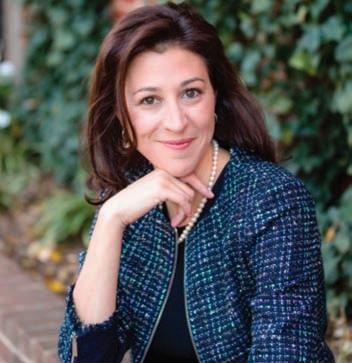
5 minute read
EMERGING LEADERS Forging the Path to Success
Marissa Coleman Vice President, Business Development, Gaming Society
As a former WNBA All-Star, NCAA Champion, Final-Four participant, ACC Rookie of the Year, and two-time All-American and FIBA gold medalist, Marissa Coleman was a force to be reckoned with before she ever stepped off the court and into the gaming industry.
Advertisement

Having learned the importance of hard work, sacrifice and adaptability in her athletic career, Coleman alchemized these skills into a new career in gaming, becoming the vice president of business development at Gaming Society.
“Playing basketball for 20-plus years taught me how to not only operate and build in team settings, but what a successful team’s makeup is,” she explains. “I’ve learned how to lead and also how to follow—and both are necessary in senior management.”
Coleman understands the need for athletes to prepare for their post-playing careers and works to pave the way for others, especially those in marginalized communities, to follow in her steps.
“As I continue this journey, I become more of a firm believer that opportunity is everything,” she says. “I have never been naïve to the fact that if I was not a great basketball player, many of the doors that opened for me would likely have been a lot harder to knock down. It is important to me to create opportunities for other Black women in senior management roles and in business.”
One of the ways Coleman has worked toward this goal was through her role as the chairwoman of the “Vote Yes on Question 2” campaign to legalize sports betting in Maryland. As chairwoman, she was able to lobby for provisions in the legislation, which included prioritizing minority and women-led businesses and ensuring that part of the tax revenue generated would go toward education. Coleman was integral in gaining sufficient voter support to pass the referendum, which was signed into law in June 2021.
“In the industry, I am most proud of the work we did in Maryland to ensure that there was diversity and inclusion language in the sports betting legislation to ensure that women and people of color could meaningfully participate in the industry,” Coleman says. “As it is important to me and a motivating factor to create opportunities for others, this was the first big step in doing so.”
Currently at Gaming Society, Coleman continues to promote diversity and inclusion by leading the company’s Bet on Women initiative, spearheading their official partnership with the WNBA to create a first-of-its-kind prediction game, and co-hosting the company’s digital show, See You in the Lobby, which celebrates the world of women’s basketball. In addition to pursuing her MBA from Georgetown University, she is also working at her company to form a council for women athletes and executives in sports and business to facilitate networking, share resources, and create opportunities for growth.
To other young professionals working their way up the corporate ladder, Coleman warns that success is a journey, and pushing for too much too fast can lead to burnout.
“I believe that in trying to achieve success quickly, you may be setting yourself up for disappointment and stress,” she advises. “Trust and enjoy the grind of growing your career. Be ready to do the work and make the sacrifices—because in the end it is absolutely worth it.”
—Rae Berkley is an analyst with The Innovation Group

Skeptic Slayer
Brianne Doura-Schawohl Founder and CEO, Doura-Schawohl Consulting LLC

Like the field she has grown so passionate about, Brianne Doura-Schawohl is having a moment. After establishing Doura-Schawohl Consulting LLC, a boutique global government relations firm specializing in problem and responsible gambling policy, just two years ago, she was named one of the “Top 100 Lobbyists” by the National Institute of Lobbying & Ethics (NILE) and to this publication’s “25 People to Watch” list later that year. GGB wasn’t wrong. In 2022, Doura-Schawohl was again named to NILE’s Top 100 as well as to The Hill’s Top Lobbyists list, recognized as an “Emerging Leader of Gaming 40 Under 40,” and appointed to the board of directors at Kindbridge Behavioral Health.
Doura-Schawohl’s rise coincides with a rejuvenated interest from gaming stakeholders in the topics of problem gambling and responsible gaming. “Despite the massive expansion of legalized sports wagering and online betting, federal and state governments have historically devoted little resources to research and prevention, and to providing treatment to people grappling with gambling problems,” she says. “This is really what prompted me to launch Doura-Schawohl Consulting.” And while the accolades might suggest otherwise, the path wasn’t exactly easy.
“Skepticism has been a challenge throughout my career,” says Doura-Schawohl. She first entered the problem gambling sector a decade ago in Massachusetts as director of policy and communications for the Massachusetts Council on Compulsive Gambling. “This was at a time that casinos were just beginning to operate there; the repeal of PASPA was still five years away—problem and responsible gambling were definitely not at the top of most industry priority lists,” she says.
Further, gambling disorder had only just been formally recognized as an addiction by mental health professionals via their DSM-V manual; and despite years of attempted education by groups like the American Gaming Association, the International Center for Responsible Gaming, and the National Council on Problem Gambling (NCPG), there remained a general lack of urgency and interest for inclusion of responsible gaming measures within policy. “I was one of the first government relations professionals to come at this on the behalf of public health,” she notes. Many wondered not just how, but if, that was going to work.
After proving it did, Doura-Schawohl was brought on as legislative director at NCPG, where she continued to advance the need alongside her career in responsible gaming. There she found a mentor in Executive Director Keith Whyte.
“He took a chance when he made me the first-ever legislative director in the organization’s nearly 50-year history,” she says, “and he encouraged me like no one else.”
Whyte gave her the platform and encouragement to utilize her voice, believe in herself, take chances, and take problem gambling and responsible gaming policy to levels never before seen. After two years of successful collaboration and issues advancement, Doura-Schawohl departed to become vice president of U.S. policy and strategic development for the international responsible gambling consultancy group EPIC Risk Management.
At EPIC, her priority was to address the disparity of programs to identify and prevent gambling addiction in the U.S. “Gambling disorder is one of the few addictions that doesn’t get addressed by the federal government in a substantive way,” she says, “and for the first time maybe ever, the industry was really starting to feel the impact and effects of that.”
A desire to focus more heavily on policy-centric work served as the impetus to opening her own firm, and with that came more skepticism. While problem gambling and responsible gaming had become a more understood and accepted piece of industry operations since Doura-Schawohl came to the work nearly a decade earlier, doubt remained about the ability to build a business around it.
But she was excited to champion this public health issue “under her own shingle,” and she is not easily deterred or intimidated. Because she has been so heavily involved in the crafting of responsible gambling policy and regulations, it’s been a natural evolution to help the industry navigate those from the other side. It’s also important to her to make the concept of responsible gaming accessible, to help the industry understand where and how it fits at all levels.
“I don’t want to sit exclusively on conference panels about responsible gambling programs, talking to the same dozen people who have cared about this issue for years,” says Doura-Schawhol. “I want to mix things up. Put me in the ‘in-game play’ discussion; let me help those people understand why this should matter to them.”
The single greatest impact on her career to date? Pushing those skeptics aside. “Deciding to gamble on myself and launch my own firm has allowed me the freedom and opportunity to create the career I desire,” she says. “It’s elevated my ability to make an even greater impact on protecting customers and the industry, all while affording me the space to prioritize my family.”
In addition to her incredible moves in gaming, DouraSchawhol is an active-duty military spouse, mother of two, and a volunteer advocate for special-needs children and their families, like her own.
—Keli Elkins is director of strategic communications for The Innovation Group









